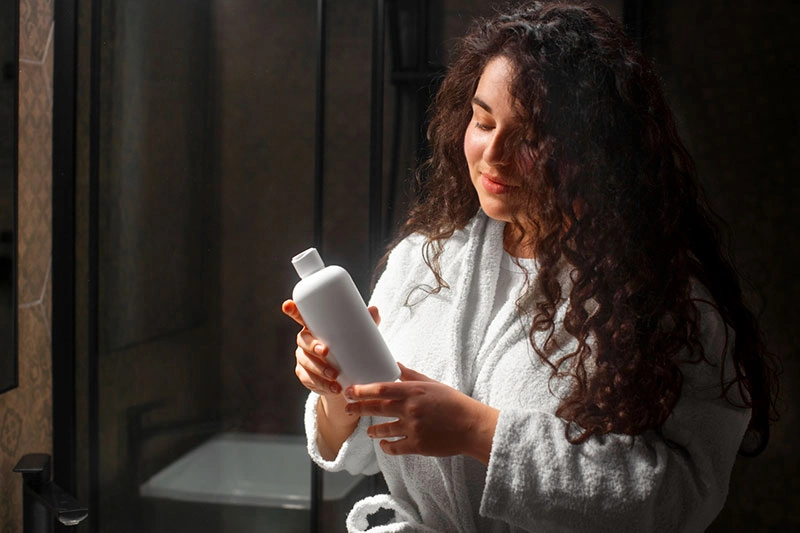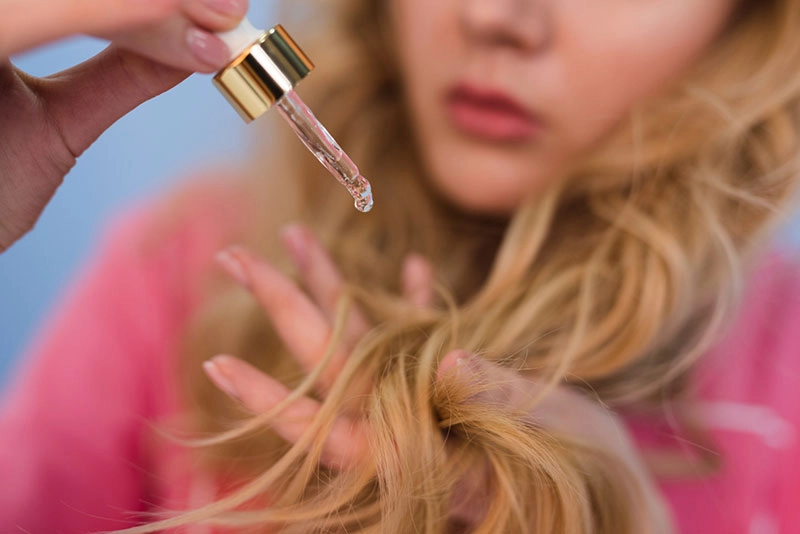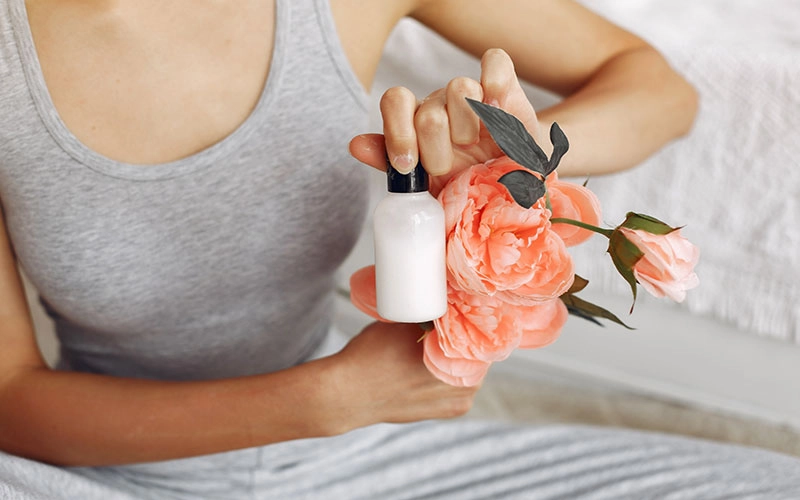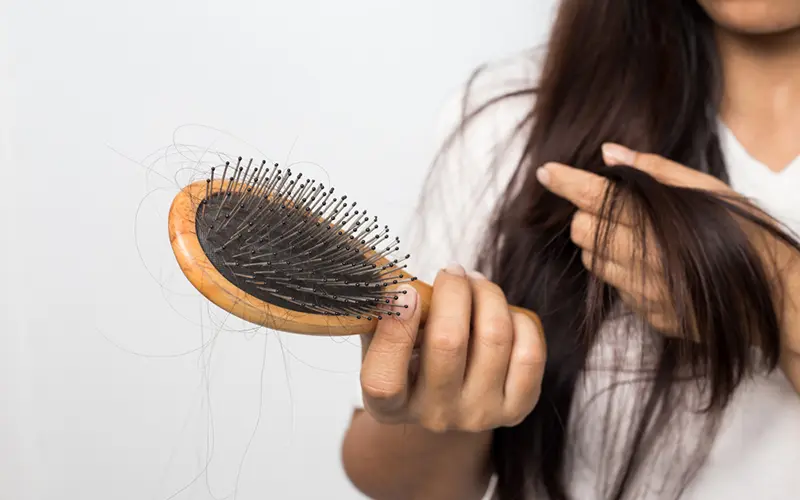Our Blog
Dry, damaged hair can be frustrating to manage, but with the right routine, you can restore its health, moisture, and strength. Whether caused by heat styling, environmental factors, or chemical treatments, dry hair requires a thoughtful approach to reverse damage and nourish it back to life. In this article, we will outline an effective haircare routine specifically designed to address dry and damaged hair, providing it with the care it needs to look and feel healthier.
Why a Specialized Haircare Routine is Important for Dry and Damaged Hair
Dry and damaged hair lacks moisture and may also suffer from weakened strands, making it more prone to breakage, split ends, and frizz. A tailored routine can help replenish moisture, strengthen the hair shaft, and reduce the appearance of damage. By focusing on hydrating ingredients and repairing treatments, you can help restore the natural beauty and vitality of your hair.
1. Start with a Gentle, Hydrating Shampoo
For dry and damaged hair, it’s important to choose a moisturizing shampoo that doesn’t strip the hair of its natural oils. Opt for sulfate-free shampoos that cleanse gently while retaining moisture. Look for products that contain nourishing ingredients like aloe vera, glycerin, or honey, which help to hydrate and repair dry hair without further damaging it.
2. Follow with a Deep Conditioning Treatment
A deep conditioning treatment is a must for dry and damaged hair. These treatments penetrate the hair shaft, providing intense moisture and nutrients to restore softness and elasticity. Use a deep conditioner once a week or as needed, depending on the level of dryness. Choose a conditioner with ingredients like keratin, shea butter, or oils such as coconut or argan oil to strengthen and hydrate the hair.
Recommended Products: Medusa Tonics
3. Incorporate Leave-In Conditioner for Extra Moisture
Leave-in conditioners are excellent for providing ongoing hydration throughout the day. After washing and conditioning your hair, apply a generous amount of leave-in conditioner to damp hair. This step helps to lock in moisture, reduce frizz, and provide heat protection when styling. Look for leave-ins that contain hydrating ingredients like panthenol and glycerin.
4. Use Natural Oils for Extra Nourishment
Natural oils are perfect for restoring shine and moisture to dry hair. Argan oil, coconut oil, and olive oil are all excellent choices for nourishing the hair. Apply a small amount of oil to the ends of your hair, where damage is usually most noticeable, to help smooth frizz and prevent split ends. You can also apply oils as a pre-shampoo treatment for deeper hydration.
5. Protect Your Hair While Styling
Heat styling tools like straighteners, curling irons, and blow dryers can further damage already dry hair. If you must use heat styling, always apply a heat protectant spray or serum to minimize damage. Additionally, avoid using heat tools on the highest setting and limit the frequency of styling. Consider using air-drying techniques whenever possible to reduce the impact of heat on your hair.

6. Trim Regularly to Prevent Split Ends
Dry hair is more prone to split ends and breakage, so regular trims are crucial to maintaining healthy hair. Aim to trim your hair every 6-8 weeks to remove damaged ends and encourage healthier growth. This also helps to reduce the appearance of frizz and keeps your hair looking fresh and manageable.
7. Incorporate a Scalp Care Routine
Healthy hair starts with a healthy scalp. Use a gentle scalp exfoliator or a nourishing scalp treatment to remove buildup and improve circulation. Massaging the scalp can also stimulate hair growth and improve the overall condition of your hair.
Recommended Article:
Conclusion
A haircare routine designed for dry and damaged hair should focus on hydration, nourishment, and gentle care. By incorporating moisturizing shampoos, deep conditioners, leave-in treatments, and natural oils, you can restore your hair’s health and shine. Regular trims and heat protection are also essential in preventing further damage and encouraging healthy hair growth.
FAQs
1. How often should I wash dry and damaged hair?
Washing hair too frequently can strip it of natural oils, so try to wash your hair 2-3 times a week. On off-days, use a dry shampoo to keep your hair fresh without over-drying it.
2. Can I use natural oils every day on dry hair?
Yes, natural oils like argan or coconut oil can be used daily, but only a small amount. Apply the oil to the ends of your hair to avoid weighing it down or making it greasy.
3. Should I avoid heat styling completely?
While it’s best to limit heat styling, you don’t have to avoid it completely. Always use a heat protectant before styling, and try to keep the temperature as low as possible. Consider heatless styling methods to give your hair a break.
Knowing your skin type is essential for choosing the right skincare products and maintaining healthy skin. Everyone’s skin is different, and understanding your skin type helps you avoid irritation, breakouts, or dryness. The five main skin types are normal, oily, dry, combination, and sensitive.
In this article, we will explain how to determine your skin type and provide some tips for taking care of it.
Recommended Products: Medusa Cleaners
How to Identify Your Skin Type
Normal Skin: If your skin is well-balanced, not too oily or too dry, and has a smooth texture, you likely have normal skin. It rarely experiences breakouts or extreme sensitivity.
Oily Skin:
If your skin appears shiny, especially in the T-zone (forehead, nose, and chin), and is prone to acne and clogged pores, you probably have oily skin. This type produces excess sebum, leading to breakouts.
Dry Skin:
If your skin feels tight, rough, or flaky, you may have dry skin. It lacks moisture and may be sensitive or prone to irritation.
Recommended Products: Medusa Tonics
Combination Skin:
If some parts of your face are oily (usually the T-zone) while other areas (like the cheeks) are dry, you have combination skin. This type requires different care for different areas.
Sensitive Skin:
If your skin reacts easily to products, turns red, or feels itchy, you likely have sensitive skin. It may be prone to conditions like rosacea or eczema.
Recommended Article: A Men’s Facial Skincare Routine for All Skin Types
Conclusion
Determining your skin type is the first step to building a skincare routine that keeps your skin healthy and glowing. Observe how your skin behaves throughout the day and how it reacts to different products.
Once you know your skin type, you can choose suitable skincare products that will help maintain its balance and health.
FAQs
1. How can I test my skin type at home?
A simple way is to wash your face with a gentle cleanser and wait for an hour without applying any products. If your skin feels tight, it’s dry. If it looks shiny, it’s oily. If only your T-zone is oily, it’s combination skin. If your skin appears balanced, it’s normal.
2. Can my skin type change over time?
Yes, factors like age, climate, diet, and skincare routine can change your skin type. For example, oily skin may become drier with age, or sensitive skin may become less reactive over time.
3. What products should I avoid for my skin type?
Oily skin: Avoid heavy creams and alcohol-based products.
Dry skin: Stay away from harsh cleansers and alcohol-based toners.
Sensitive skin: Avoid fragrances, alcohol, and strong exfoliants.
Combination skin: Use lightweight, non-comedogenic products.
Healthy, shiny hair is a common beauty goal, and natural oils are a fantastic way to achieve it. Packed with essential nutrients, vitamins, and fatty acids, these oils nourish the hair from root to tip, strengthening it, adding shine, and improving overall texture. In this article, we explore some of the most effective natural oils for strengthening and adding shine to your hair, as well as how to incorporate them into your haircare routine.
Why Natural Oils Are Essential for Healthy Hair
Natural oils are loaded with beneficial properties that promote hair health. They deeply moisturize the hair and scalp, reduce frizz, and restore natural shine without the use of harsh chemicals. These oils can penetrate the hair shaft, providing nourishment from within, which leads to stronger and shinier hair over time.
1. Argan Oil: The Liquid Gold for Shiny Hair
Argan oil, often referred to as “liquid gold,” is one of the best oils for promoting shine and strengthening hair. Rich in vitamin E, essential fatty acids, and antioxidants, it nourishes the hair, making it softer and more manageable. Argan oil also helps to protect hair from heat damage, making it a go-to option for those who regularly use styling tools.
Recommended Products: Medusa Tonics
2. Coconut Oil: Deep Moisture and Strength
Coconut oil is known for its deep moisturizing properties, helping to prevent hair from becoming dry and brittle. Packed with fatty acids, it penetrates the hair shaft, reducing protein loss and strengthening the hair from within. Regular use of coconut oil can lead to stronger, shinier hair that looks healthy and nourished.
3. Jojoba Oil: Moisturize and Restore Shine
Jojoba oil closely resembles the natural oils produced by the scalp, making it an excellent choice for hydrating the hair without weighing it down. It helps to balance oil production, making it suitable for both dry and oily hair types. Jojoba oil also restores natural shine and promotes healthy hair growth, making it a versatile addition to any haircare routine.
4. Olive Oil: Nourish and Repair
Olive oil is packed with antioxidants and healthy fatty acids, making it an excellent choice for repairing damaged hair and adding shine. It helps to hydrate dry hair, smooth frizz, and enhance the hair’s natural luster. Olive oil is also rich in vitamins A and E, which help protect the hair from environmental damage and keep it looking healthy.
5. Castor Oil: Strengthen and Promote Growth
Castor oil is known for its ability to promote hair growth and strengthen hair follicles. It is packed with ricinoleic acid, which helps to improve circulation to the scalp, leading to healthier hair growth. Castor oil also adds shine and helps to smooth the hair, reducing split ends and frizz.
How to Use Natural Oils for Maximum Benefits

To reap the full benefits of natural oils, it’s important to apply them correctly. Start by choosing the right oil for your hair type and needs. For deep conditioning, apply the oil to damp hair and leave it on for at least 30 minutes before washing it out. You can also use a small amount of oil as a leave-in treatment to add shine and protect the hair from environmental damage.
Recommended Article:
Conclusion
Natural oils are an excellent and chemical-free way to strengthen your hair and add a healthy shine. Whether you choose argan oil for its moisturizing properties, coconut oil for deep hydration, or castor oil for promoting growth, incorporating these oils into your routine can lead to healthier, shinier, and more manageable hair.
FAQs
1. Can I use natural oils on oily hair?
Yes, certain natural oils like jojoba oil are great for balancing oil production on the scalp without making your hair greasy. Always use oils sparingly on oily hair and avoid applying them directly to the scalp if you have an oily scalp.
2. How often should I use oils for my hair?
It depends on your hair type and needs. For dry hair, you can apply oils once a week or even more frequently as a deep conditioning treatment. For oily hair, it’s best to use oils sparingly, once every 1-2 weeks, or just as a leave-in treatment to add shine.
3. Can I leave natural oils in my hair overnight?
Yes, many oils, such as coconut and argan oil, can be left in overnight for a deeper conditioning treatment. Just be sure to cover your pillow with a towel or use a shower cap to prevent the oil from transferring to your bedding.
Fragrance is a common ingredient in many skincare products, from moisturizers to cleansers, offering a pleasant scent that can enhance the user experience. However, when it comes to skincare, the question arises: is fragrance truly beneficial, or can it be harmful to our skin? In this article, we explore the potential effects of fragrance in skincare and whether it’s a helpful addition or an ingredient to avoid.
Fragrance in Skincare: A Blessing or a Curse?
Fragrance is a popular ingredient in many skincare products, but it can have both positive and negative effects depending on your skin type and sensitivities. In this section, we explore the different aspects of fragrance in skincare, from its appeal to the potential risks it poses for sensitive skin.
1. The Appeal of Fragrance in Skincare
Fragrance in skincare products can make the application process more enjoyable. A pleasing scent can elevate the skincare ritual, adding a sense of luxury and relaxation. Many people associate fragrant products with cleanliness and freshness, which can contribute to the overall experience of using skincare.
Recommended Products: Medusa Tonics
2. Fragrance as a Potential Irritant
Despite its pleasant qualities, fragrance can cause irritation for certain skin types. Sensitive skin, in particular, is more prone to reactions such as redness, itching, or dryness when exposed to fragranced products. This is because fragrances often contain a mix of chemicals that can disrupt the skin’s natural barrier, leading to inflammation or allergic reactions.
3. The Risk of Allergies and Sensitivity
Fragrances, especially synthetic ones, are one of the top allergens in skincare products. Many fragrances contain compounds that can trigger allergic reactions, ranging from mild skin irritation to more severe reactions like rashes or hives. In some cases, fragrance ingredients can even contribute to the development of conditions like contact dermatitis, which results in red, swollen, and itchy skin.
Recommended Products: Medusa Cleaners
4. Fragrance-Free vs. Unscented: What’s the Difference?
It’s important to distinguish between “fragrance-free” and “unscented” products. Fragrance-free means that no fragrances or masking agents have been added to the product, which is ideal for individuals with sensitive skin. On the other hand, unscented means that the product might still contain ingredients that neutralize the scent, but without adding any fragrance. For those with skin sensitivities, opting for fragrance-free products is generally a safer choice.
5. Fragrance and Skin Health
For individuals with certain skin conditions such as eczema, rosacea, or acne, fragrance can exacerbate symptoms and worsen flare-ups. It can also lead to long-term skin sensitivity, which might make the skin more reactive to other skincare products in the future. While fragrances may offer short-term enjoyment, their potential to damage or irritate sensitive skin over time is a significant concern.
6. Natural vs. Synthetic Fragrance: Which is Safer?
Both natural and synthetic fragrances can cause irritation, but synthetic fragrances often contain more chemicals, which may increase the risk of adverse reactions. Natural essential oils are often considered a more skin-friendly alternative; however, they can also be irritating for some individuals, especially when used in high concentrations. As with any skincare ingredient, it’s essential to patch-test products containing fragrance to check for any potential reactions.
7. Is Fragrance Worth It?
The decision to use fragranced products in your skincare routine depends on your skin type, sensitivities, and personal preferences. While fragrance can offer a pleasant sensory experience, the potential for irritation and allergic reactions is not to be ignored. For those with sensitive or reactive skin, fragrance-free or natural alternatives are often the better choice for maintaining skin health and avoiding irritation.
Recommended Article:
Conclusion
Fragrance in skincare is a double-edged sword. While it can provide a luxurious and enjoyable experience, it also carries the potential for irritation and sensitivity, especially for individuals with delicate or compromised skin. For those with sensitive skin or skin conditions, opting for fragrance-free products or products with natural, gentle fragrances is often the safest choice. Ultimately, the key is to listen to your skin and choose products that cater to your individual needs, ensuring both efficacy and comfort in your skincare routine.
FAQs
1. Can fragrance in skincare cause skin irritation?
Yes, fragrance can be a common irritant, especially for those with sensitive skin. It may lead to redness, itching, or dryness, as fragrances often contain compounds that can disrupt the skin’s natural barrier.
2. What’s the difference between "fragrance-free" and "unscented"?
“Fragrance-free” means no fragrances or masking agents have been added to the product, while “unscented” can still contain neutralizing agents to mask the scent without adding actual fragrance.
3. Is natural fragrance better than synthetic fragrance for the skin?
While natural fragrances from essential oils are often considered gentler, they can still cause irritation in some individuals. Synthetic fragrances, on the other hand, may contain more chemicals, increasing the risk of adverse reactions. It’s essential to patch-test before using any fragranced product.
Jojoba oil, derived from the seeds of the jojoba plant (Simmondsia chinensis), has become increasingly popular in skincare and haircare routines due to its numerous benefits. Rich in vitamins, minerals, and essential fatty acids, jojoba oil offers a natural solution for a range of beauty concerns. In this article, we will explore the benefits of jojoba oil and how it can help improve both your skin and hair health.
Why Jojoba Oil is a Game Changer for Your Skin and Hair?
Jojoba oil is a powerful natural ingredient that offers numerous benefits for both skin and hair. Its unique composition, rich in vitamins, minerals, and essential fatty acids, helps to hydrate, balance, and protect, making it a must-have for enhancing your beauty routine.
1. Moisturizes and Nourishes Skin
One of the most well-known benefits of jojoba oil is its ability to hydrate the skin. Jojoba oil is a natural emollient, meaning it helps to lock in moisture and prevent skin from drying out. Its chemical composition closely resembles that of the skin’s natural oils, making it a great option for those with dry or sensitive skin. Whether used as a daily moisturizer or part of a nighttime routine, jojoba oil helps to keep your skin soft, smooth, and supple.
Recommended Products: Medusa Tonics
2. Balances Oil Production
For individuals with oily skin, jojoba oil can actually help regulate oil production. The benefits of jojoba oil extend to balancing the skin’s sebum levels, preventing both excess oil and dehydration. By mimicking the skin’s natural oils, jojoba oil tricks the skin into thinking it has produced enough oil, thus reducing overproduction. This can be particularly helpful for those prone to acne, as excess oil can contribute to clogged pores.
3. Soothes Skin Irritations
Jojoba oil has anti-inflammatory properties that can help calm irritated skin. Whether dealing with eczema, rosacea, or other inflammatory skin conditions, the benefits of jojoba oil can provide relief. Its soothing nature helps reduce redness and promotes healing, making it a gentle and effective solution for sensitive skin.
4. Promotes Hair Health
Not only does jojoba oil benefit your skin, but it also works wonders for your hair. When massaged into the scalp, it helps to moisturize the hair follicles and prevent dryness. The benefits of jojoba oil for hair include promoting healthy hair growth by nourishing the scalp, which is essential for strong, thick hair. Its ability to balance oil production on the scalp can also help with dandruff issues, making it a versatile and effective hair care product.
5. Adds Shine and Strength
Jojoba oil is known for its ability to enhance the natural shine of your hair. Regular use of jojoba oil can make your hair look healthier, shinier, and more manageable. The benefits of jojoba oil extend to reducing frizz and split ends, leaving you with soft, smooth, and well-nourished hair.
Recommended Article: A Men’s Facial Skincare Routine for All Skin Types
Conclusion
The benefits of jojoba oil for both skin and hair are vast and versatile. From moisturizing and nourishing the skin to promoting healthy hair growth and reducing scalp irritation, jojoba oil is a must-have in your beauty routine. Its natural composition makes it suitable for all skin types and hair textures, offering a gentle yet effective solution for your skincare and haircare needs. If you haven’t already, consider incorporating jojoba oil into your daily regimen and experience the remarkable benefits it provides.
FAQs
1. How does jojoba oil help with acne?
Jojoba oil mimics the natural oils produced by the skin, helping to regulate oil production. By balancing sebum levels, it can prevent excess oil that leads to clogged pores, which is one of the main causes of acne. Additionally, its anti-inflammatory properties can help calm irritated skin and reduce redness associated with acne.
2. Can jojoba oil be used on all skin types?
Yes, jojoba oil is suitable for all skin types. Its non-comedogenic nature means it won’t clog pores, making it safe for oily and acne-prone skin. It’s also gentle enough for dry and sensitive skin, providing hydration and nourishment without irritation.
3. How should I apply jojoba oil to my hair?
To use jojoba oil on your hair, apply a small amount directly to your scalp and gently massage it in. You can leave it on for 15–30 minutes as a deep conditioning treatment or use it as a leave-in conditioner to add shine and prevent frizz. It’s best to apply it to damp hair for easier absorption.
Hair loss can be alarming, whether it happens gradually or suddenly. If you’ve been asking yourself, “Why am I losing hair?” you’re not alone. Understanding the Causes of Hair Loss is the first step toward finding a solution that works for you.
Common Causes of Hair Loss
Understanding the root of your hair loss starts with exploring the most frequent triggers. Below are some of the most well-documented and researched Causes of Hair Loss that affect both men and women.
1. Genetics (Androgenetic Alopecia)
One of the most common Causes of Hair Loss is genetics. Known as male or female pattern baldness, this type of hair loss is hereditary and often starts gradually with thinning at the crown or hairline.
2. Hormonal Changes
Hormonal shifts—such as those during pregnancy, menopause, or thyroid imbalances—can also trigger hair loss. These changes disrupt the natural growth cycle, making them a key factor among the Causes of Hair Loss in women and men alike.
Recommended Products: Medusa Cleaners
3. Stress and Emotional Shock
Physical or emotional stress can shock the hair follicles, pushing them into a resting phase. This condition, called telogen effluvium, is temporary but significant. Among lifestyle-related Causes of Hair Loss, stress is one of the most overlooked.
4. Nutritional Deficiencies
Lack of essential nutrients like iron, protein, biotin, or vitamin D can weaken hair and lead to shedding. Poor diet is a preventable entry on the list of Causes of Hair Loss and often improves with supplementation and better eating habits.
5. Medical Conditions and Medications
Autoimmune diseases like alopecia areata, scalp infections, or chronic illnesses can directly affect hair health. Additionally, medications for cancer, high blood pressure, depression, and more are recognized Causes of Hair Loss.
6. Hair Care Habits
Tight hairstyles, harsh chemical treatments, and frequent heat styling can damage follicles and cause breakage. These habits are avoidable Causes of Hair Loss and can be reversed by adopting gentler hair care routines.
7. Aging
As we age, hair naturally becomes thinner and less dense. This gradual process is one of the unavoidable Causes of Hair Loss, often managed with volumizing products or topical treatments like minoxidil.
Recommended Products: Medusa Tonics
8. Postpartum Hair Loss
Many women experience hair shedding a few months after giving birth. This condition, caused by a sudden drop in estrogen levels, is temporary but noticeable. It’s one of the hormonal Causes of Hair Loss that typically resolves within a year.
9. Environmental Factors
Pollution, UV radiation, and exposure to toxins can weaken hair shafts and follicles over time. These external elements are less obvious but real Causes of Hair Loss, particularly in urban areas.
10. Overuse of Hair Products
Heavy use of gels, sprays, and other styling products can build up on the scalp and clog follicles, eventually leading to hair thinning or breakage. Misuse of such products is among the preventable Causes of Hair Loss.
11. Rapid Weight Loss or Fad Diets
Dramatic weight changes and restrictive diets can shock the body and disrupt hair growth. These nutrition-related disruptions are underestimated Causes of Hair Loss that often catch people by surprise during major body transformations.
Recommended Article:
Conclusion
Losing hair can be distressing, but identifying the underlying reason makes it easier to take the right action.
Whether it’s genetics, stress, hormones, or hair care habits, knowing the Causes of Hair Loss empowers you to seek proper treatment, adjust your lifestyle, and support healthier hair growth in the long run.
FAQs
1. Can hair loss caused by genetics be reversed?
Genetic hair loss is usually permanent, but treatments like minoxidil and finasteride can slow it down and sometimes promote regrowth.
2. How long does stress-related hair loss last?
Stress-induced hair loss typically lasts a few months and improves once the stress is managed and the hair follicles recover.
3. Should I see a doctor if my hair loss is sudden or patchy?
Yes, sudden or patchy hair loss may indicate an underlying medical condition and requires professional evaluation for proper diagnosis and treatment.






